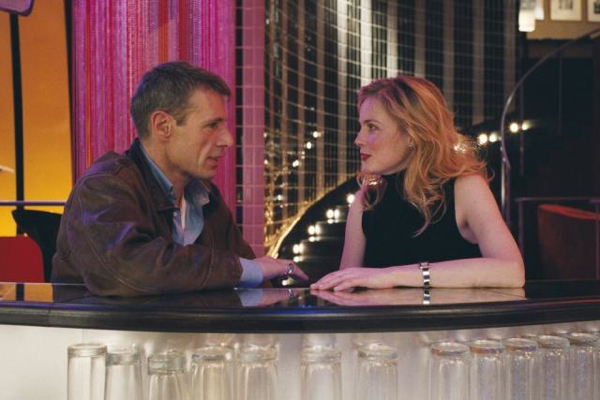Movie review by Greg Carlson
Legendary French filmmaker Alain Resnais returns to playwright Alan Ayckbourn for source material, adapting “Private Fears in Public Places” for the screen. Known as “Coeurs” outside of North America, “Private Fears in Public Places” offers the octogenarian a prime opportunity to explore one of his long-held thematic obsessions: loneliness and the ways people deal with it. Connecting the often unfulfilled lives of its six Paris inhabitants in sometimes surprising ways, the movie transcends its theatrical origin, even if Resnais never seems particularly bothered by it in the first place. Although the quality of the piece never comes close to the director’s best known movies of the late 1950s and early 1960s, it will please viewers seeking wistful, bittersweet romanticism.
Real estate broker Thierry (Andre Dussollier) lives with his younger sister Gaelle (Isabelle Carre), a frustrated single who seeks companionship through contacts made in personal ads. Thierry shows apartments to Nicole (Laura Morante), whose engagement to moody boozehound Dan (Lambert Wilson) appears less than stable. Additionally, Thierry’s seemingly prim co-worker Charlotte (Sabine Azema) moonlights as a personal caregiver for the verbally abusive father of bartender Lionel (Pierre Arditi), who works at Dan’s favorite watering hole. Additionally, Charlotte loans Thierry videotapes of her favorite television program, and he discovers mysterious erotic content after the episodes have ended.
Most of the characters also intersect in other pairings, and with the exception of Nicole and Lionel, who often disappear from the action, Resnais nimbly juggles the storylines. Much of the movie is composed of fairly short, fairly tidy scenes that have the effect of building upon one another as terminal velocity is reached. Some of the outcomes are satisfying, while others seem to demand more explication. A few of the characters also act out with almost hypocritically confusing actions, which will delight some and frustrate others. Charlotte in particular would provide a psychoanalyst with a meaty case study.
The purposely artificial quality of the production design enhances the tone of the movie, and Resnais occasionally chooses to peer down at the characters from an overhead angle, a tactic that evokes the attitude of a casual god observing laboratory specimens. Rooms are visually divided in two, from the severed apartment Nicole considers renting in the first scene of the movie to the sleek beaded curtain behind the hotel bar where Lionel pours drinks. To top it off, Resnais also keeps the snow falling from start to finish, which blankets the proceedings with wintry beauty.
Resnais clearly relishes observing human behavior, and the movie regularly incorporates scenes in which messages are perhaps sent but not received, or signals go misinterpreted. Small humiliations are depicted with affection, and serve as rueful reminders of our own embarrassments. “Private Fears in Public Places” is also quite funny, and Resnais coaxes many slyly humorous bits from the seasoned cast. None of the characters in the story are novices in life, and the suggestion of their collective life experience serves as a welcome contrast to movies celebrating callow youth just coming of age.
